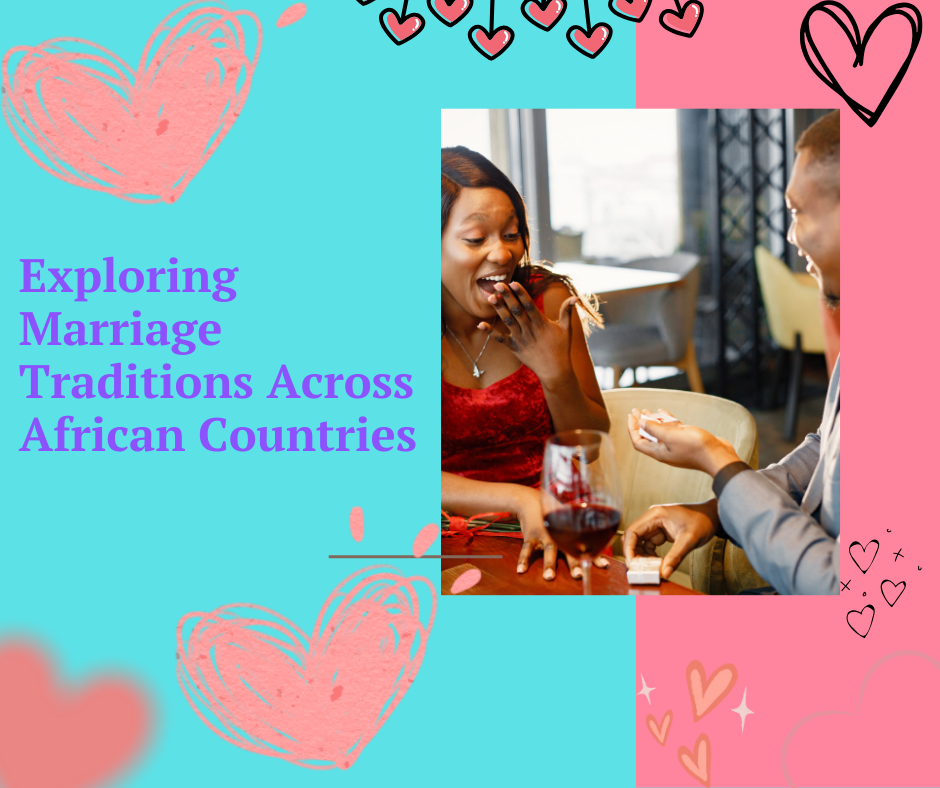1. Nigeria: The Yoruba Traditional Wedding
In Nigeria, the Yoruba people are known for their elaborate and colorful traditional weddings. The ceremony, known as Igba Nkwu, involves several stages, including the introduction (Mo mi mo e), the engagement (Idana), and the main wedding event. A key highlight is the prostration by the bride and groom, where they kneel or lie flat to show respect to their elders. The bride’s attire, often a gele (headwrap) and iro (wrapper), is complemented by the groom’s agbada (flowing robe). The ceremony is filled with music, dancing, and the sharing of kola nuts, which symbolize hospitality and unity.
2. Ghana: The Knocking Ceremony (Kokooko)
In Ghana, the Akan people practice the knocking ceremony (kokooko), which marks the formal introduction of the groom’s family to the bride’s family. The groom’s family brings gifts, such as drinks, money, and sometimes a ring, to “knock” on the door of the bride’s family. If the bride’s family accepts the gifts, it signifies their approval of the union. This ceremony is followed by the traditional wedding, where the couple exchanges vows amidst drumming, dancing, and the pouring of libations to honor ancestors.
3. Kenya: The Maasai Blessing
Among the Maasai people of Kenya and Tanzania, marriage is a communal affair that involves the entire village. The bride is escorted to her new home by a group of women, singing and dancing along the way. Before the wedding, the bride’s head is shaved, and she is adorned with intricate beadwork and jewelry. The groom, dressed in traditional shukas (robes), presents gifts of cattle to the bride’s family as a symbol of his commitment. The ceremony concludes with the elders blessing the couple, wishing them prosperity and fertility.
4. South Africa: The Zulu Umabo Ceremony
The Zulu people of South Africa celebrate marriage through the Umabo ceremony, a traditional event that follows the Western-style wedding. During the Umabo, the bride changes into traditional attire, including a isidwaba (leather skirt) and inhloko (headpiece), while the groom wears animal skins. The bride’s family presents her with gifts, such as blankets and household items, to prepare her for married life. A significant part of the ceremony is the ukucimela, where the bride demonstrates her homemaking skills by sweeping the floor, symbolizing her readiness to take on her new role.
5. Ethiopia: The Coffee Ceremony
In Ethiopia, marriage traditions often include the famous coffee ceremony, a ritual that symbolizes hospitality and community. During the wedding celebration, the bride’s family prepares coffee by roasting, grinding, and brewing the beans in front of the guests. The aroma of the coffee fills the air as the couple receives blessings from their elders. The ceremony is accompanied by traditional music and dancing, creating a festive atmosphere that celebrates the union of two families.
6. Morocco: The Henna Night (Laylat al-Henna)
In Morocco, the wedding festivities begin with the Henna Night, a pre-wedding ritual where the bride’s hands and feet are adorned with intricate henna designs. The henna symbolizes good luck, beauty, and protection from evil spirits. The event is attended by close family and friends, who sing, dance, and celebrate the bride’s upcoming marriage. The following day, the wedding ceremony takes place, often featuring a grand feast, traditional music, and the exchange of vows.
7. Egypt: The Zaffa Procession
In Egypt, the wedding celebration begins with the Zaffa, a lively procession that includes drummers, dancers, and performers. The bride and groom are escorted to the wedding venue amidst music, singing, and fireworks. The Zaffa is a symbol of joy and celebration, marking the start of the couple’s new life together. During the ceremony, the couple exchanges rings and shares a piece of cake, symbolizing their unity. The festivities continue with a lavish feast and dancing late into the night.
8. Senegal: The Wolof Marriage Traditions
Among the Wolof people of Senegal, marriage is a multi-step process that begins with the ndutal (betrothal ceremony). The groom’s family presents gifts, such as kola nuts and money, to the bride’s family as a sign of respect. The wedding itself is a vibrant celebration featuring traditional music, dance, and a feast. A unique aspect of Wolof weddings is the takkusaan, where the bride’s family provides her with a dowry of household items to help her start her new life.
Conclusion
Marriage traditions across African countries are as diverse as the continent itself, each offering a unique glimpse into the cultural heritage and values of its people. From the colorful Yoruba weddings in Nigeria to the lively Zaffa processions in Egypt, these traditions celebrate love, unity, and community in meaningful and memorable ways. By exploring these customs, we gain a deeper appreciation for the richness of African culture and the enduring significance of marriage as a sacred institution. e importance of contributing to the well-being of others.
